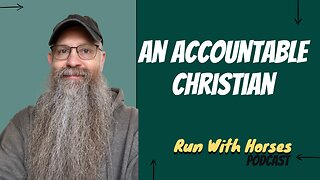Premium Only Content

The Challenge of Shepherding a Church Part 2
24_10_26 -Ep.335 - Run With Horses Podcast - The Challenge of Shepherding a Church Part 2
Podcast: rwh.podbean.com
Website: www.runwithhorses.net
Youtube: https://youtube.com/@rwhpodcast
Facebook: https://www.facebook.com/RWHpodcast
Instagram: https://www.instagram.com/rwh_podcast
Twitter: https://twitter.com/RWH_podcast
Susan’s New book – Parenting Manual
https://a.co/d/8L7GWIo
Norman’s New book – Pursuing Godliness Together - It’s a practical, quick read!
https://a.co/d/c7Y7F04
***(28:00)*** END ***(27:00)***
I have been talking about the church and how we can develop an intentional process to live out out purpose in the world. Today, I want to focus on the role of the pastor in all of this. What a big job!
Welcome to Run With Horses! My name is Norman and my goal is to help you thrive as a follower of Jesus. The spiritual life is both incredibly simple and potentially the most difficult part of your life. God invites you to live intentionally and on His mission. It’s very cool that we can do that together!
Thank you for joining me today! If you are new to the show, you can find our past shows on our website, runwithhorses.net. I have spent several weeks focusing on a definition of the church and the current discussion about a discipleship pathway is best understood in the context of our broader look at the church. If you have been enjoying the show, I would appreciate it if you would leave a review wherever you are listening! And as always, your questions, comments and feedback are welcome. Write me at norman@runwithhorses.net. And now, on with the show...
***(27:00) ***END***(23:00)****
Habits – Personal Humility and Teachability
• Habit: Maintain a posture of humility, being teachable and open to correction and growth.
• Biblical Basis: "Humble yourselves before the Lord, and he will lift you up." (James 4:10)
Philippians 2:5 Let this mind be in you which was also in Christ Jesus, 6 who, being in the form of God, did not consider it robbery to be equal with God, 7 but made Himself of no reputation, taking the form of a bondservant, and coming in the likeness of men. 8 And being found in appearance as a man, He humbled Himself and became obedient to the point of death, even the death of the cross.
• Why It’s Important: Pride can hinder spiritual growth and effectiveness in discipling others. Humility allows the disciple maker to continue growing and learning. Prides keeps you at the center, Humilty helps keep Jesus at the center.
***(23:00)***END***(0:00)
Shepherding and equipping a church for ministry requires a lot from a pastor.
1. **Spiritual Leadership**
- **Biblical Knowledge****Prayer Life****Discernment**
2. **Preaching and Teaching**
- **Effective Communication****Teaching Skills**
3. **Relational Skills**
- **Empathy and Compassion****Conflict Resolution****Mentoring and Discipleship**
4. **Leadership and Vision Casting**
- **Visionary Leadership****Decision-Making and Strategy****Delegation**
5. **Equipping and Empowering**
- **Recognizing Gifts in Others****Training and Development****Empowerment – give authority away to others**
6. **Administration and Organization**
- **Organizational Skills****Team Building****Budgeting and Stewardship**
7. **Emotional Intelligence**
- **Self-Awareness****Ability to read the room****Resilience**
8. **Counseling and Pastoral Care**
- **Counseling Skills****Crisis Management**
9. **Cultural Awareness and Engagement**
- **Cultural Sensitivity**: Churches are often diverse in terms of culture, background, and socioeconomic status. A pastor must be culturally aware and sensitive, able to foster an inclusive environment where everyone feels welcome.
- **Community Engagement**: Pastors should have a heart for the local community and a strategy for how the church can serve outside its walls. Engaging with local needs and being a visible presence in the community helps fulfill the church’s mission.
10. **Adaptability and Lifelong Learning**
- **Adaptability**: The church and broader culture are always changing. Pastors must be flexible, able to adapt their leadership and ministry approaches to meet new challenges, such as changes in technology, social issues, or generational shifts.
- **Continual Growth**: Great pastors are lifelong learners, committed to their own spiritual, intellectual, and professional growth. Attending conferences, pursuing theological education, or engaging with mentors helps pastors stay sharp and effective in their ministry.
11. **Personal Integrity and Character**
- **Moral Integrity**: Above all, pastors need to model Christlike character, demonstrating integrity, humility, and faithfulness in their personal and professional lives. Trust is central to leadership, and integrity is foundational to building that trust.
- **Servant-Heartedness**: Pastors should approach their leadership role with humility and a desire to serve others, following the example of Christ, who came not to be served but to serve (Matthew 20:28).
By developing these skills, a pastor can effectively shepherd the congregation, equip members for ministry, and create a thriving, Christ-centered church community.
Balancing the various responsibilities of a pastor—such as sermon preparation, counseling, small groups, leadership, and training — requires intentional time management and prioritization. Here's a strategy to help a pastor manage these tasks effectively:
1. **Set Priorities and Define Time Blocks**
- **Sermon Preparation:** This is typically the pastor's core weekly responsibility, so allocate large, uninterrupted blocks of time. Many pastors reserve the best mental energy times, such as mornings, for sermon prep. A typical week might include:
- **Monday**: Initial study and prayer for the sermon.
- **Tuesday/Wednesday**: Deep study, outlining, and drafting.
- **Thursday**: Finalizing and practicing delivery.
- **Counseling:** Set dedicated times during the week for counseling appointments. For instance, 1-2 afternoons can be reserved for pastoral care and counseling.
- **Small Groups and Discipleship:** These typically occur in the evening. You can limit these to a few nights per week (e.g., Tuesday and Thursday) and delegate or raise up other leaders to assist in leading groups.
- **Leadership and Training:** Set aside time for leadership development, meetings, or training sessions. This can be scheduled weekly or bi-weekly, depending on the need. For example, leadership meetings could be set for Monday or Wednesday afternoons, before or after sermon prep.
2. **Delegate Where Possible**
Pastors often feel they need to do everything themselves, but delegating is key to maintaining balance. Assign trusted team members or volunteers to lead certain small groups, handle administrative tasks, or even assist in some counseling roles.
***(00:00)*** END PART 1***
___________________
***(27:00) ***BEGIN PART 2 ***END ***(5:00)***
3. **Utilize Early Mornings or Evenings for Training and Leadership**
If training leaders or discipling key individuals is a priority, use early mornings for small leadership huddles or evenings if that works better for the participants. Short, focused meetings (e.g., breakfast meetings) can maximize time without disrupting the rest of the day.
4. **Batch Similar Tasks**
Instead of switching between different types of work throughout the day, batch similar tasks together. For instance, group all counseling appointments on specific days and leave other days for sermon prep and leadership training. This minimizes transition time and helps you stay mentally focused on one type of task at a time.
5. **Personal Development Time**
Block time each week for your own spiritual and professional growth. Without this, it can be easy to burn out. This might include personal Bible study, prayer, or reading to stay refreshed.
6. **Protect Your Sabbath**
Schedule a clear day of rest each week to recharge. It’s important for pastors to guard their time for personal renewal, family, and spiritual refreshment.
### Example Typical Weekly Schedule:### Where is the rest?
- **Monday:**
- Morning: Sermon prep (Initial study, prayer, and research)
- Afternoon: Counseling and administrative tasks
- Evening: Rest/Family time
- **Tuesday:**
- Morning: Sermon prep (Deep study and outlining)
- Afternoon: Counseling appointments
- Evening: Small group meeting or discipleship group
- **Wednesday:**
- Morning: Sermon prep (Writing and structuring)
- Afternoon: Leadership team meeting or training session
- Evening: Midweek service or discipleship training
- **Thursday:**
- Morning: Sermon prep (Finalization and practice)
- Afternoon: Free for flexible needs or meetings
- Evening: Small group meeting or discipleship
- **Friday:**
- Morning: Personal study and prayer (Sabbath/Rest day)
- Afternoon: Counseling or visiting members
- Evening: Rest/Family time
- **Saturday:**
- Morning: Free for sermon review or final prep
- Afternoon: Outreach, ministry, or personal rest
- Evening: Rest
- **Sunday:**
- Preaching and ministry day
## My Thoughts on a Weeks Schedule
Sunday AM Message – Theology of the week – Main theme for the body to focus on this week.
Sunday PM – small group ministry, each group asks specific questions about the application of the morning theme and discusses personal application and questions. Feedback for the pastor should come from these groups, what wasn’t understood or agreed with?
Midweek small groups – prayer focused on living out the mission of Jesus, who are we reaching out to now, how are we doing in living out the Sunday Am message. How can we pray for each other and answer questions that come up as we make real attempts to be followers of Jesus.
SS AM before next Message and new theme – final thoughts on the theme from last week, questions about application, encouragement to continue applying this truth to their lives
For the pastor,
First thing on the schedule is Personal pursuit of Jesus.
Second is time with men he is equipping for ministry. Ideally every pastor would always have 2-3 men he is training. Give them your best time and meet when they are available. As men are trained and able to come alongside in ministry time is freed up for the pastor to train others. I put prep for these men above sermon prep.
Third, prep for weekly theme. Ideally these consistently builds and are related so you aren’t starting from zero, ever. The focus should be practical truths that, when applied in the life of the believer, lead them closer to Jesus and His mission.
Fourth, general ministry activities and life of the church tasks. Delegate as many of these as possible. You serve the church body best not by doing everything for them but by helping them see that they are the church and it is their responsibility to be the church.
****(5:00) ***END***( 1:00)***
DOCTRINE
October – Bible
Authority of the Bible
Inerrancy of the Bible
Sufficiency of the Bible
Necessity of the Bible
Necessity: Related to sufficiency, but slightly different, this doctrine holds that “the Bible is necessary for knowing the gospel, for maintaining spiritual life, and for knowing God’s will,
but is NOT necessary for knowing that God exists or for knowing something about God’s character and moral laws” (Grudem, Systematic Theology, 116). This gets at the difference between special and general revelation.
Scripture alone provides special revelation: knowledge of God’s will and salvation
Rom. 10:13–17 – 13 For “whoever calls on the name of the Lord shall be saved.”
Israel Rejects the Gospel
14 How then shall they call on Him in whom they have not believed? And how shall they believe in Him of whom they have not heard? And how shall they hear without a preacher? 15 And how shall they preach unless they are sent? As it is written:
“How beautiful are the feet of those who preach the gospel of peace,
Who bring glad tidings of good things!”
16 But they have not all obeyed the gospel. For Isaiah says, “Lord, who has believed our report?” 17 So then faith comes by hearing, and hearing by the word of God.
18 But I say, have they not heard? Yes indeed:
“Their sound has gone out to all the earth,
And their words to the ends of the world.”
Acts 4:12 – 12 Nor is there salvation in any other, for there is no other name under heaven given among men by which we must be saved.”
**(1:00)**END**(00:00)
Thanks for joining me again today!
I think you will agree with me that the role of the pastor is a big job. If you are not a pastor, take some time to pray for yours today. If you are a pastor, thank you for your service and take some time to ask God to continue growing you in Christ-likeness as you serve.
If you enjoyed the show you can listen to all the past shows wherever you listen to podcasts. A good place to start is at runwithhorses.net. You can also write me at norman@runwithhorses.net or leave a comment on the Run With Horses Podcast facebook page. Take time today to pause and thank God for His work in your life and keep running.
(00:00)
Parenting Manual and Pursuing Godliness Together
Susan’s New book – Parenting Manual
https://a.co/d/8L7GWIo
My wife has a new book out. She took some of the lessons from Scripture that helped us as parents and put them together into a parenting manual written as one thought a day from the Bible. You can find it on Amazon by searching for Susan Jane Smith, Parenting Manual. I also have a link in the show notes.
If you are a parent or know a parent who is interested in raising godly children, this book can point you to Scripture that will help you keep your focus as you take the journey with your children. The book is $5 and is available as a paperback or kindle book. If you read it, leave her a review, it really does help others find it! Thanks!
-
 56:00
56:00
Run With Horses Podcast
1 month agoAn Accountable Christian
151 -
 8:06
8:06
The Shannon Joy Show
12 hours ago💣 D.C. Elites Party While America Prepares for War
5291 -
 17:18
17:18
Breaking Points
17 hours agoTucker Carlson EXPOSES Ted Cruz Iran IGNORANCE
2153 -
 10:13
10:13
BitcoinBros
17 hours ago $0.01 earned$MSTR & Bitcoin Getting Ready For TAKEOFF! - BTC Treasury News
351 -
 17:21
17:21
Actual Justice Warrior
16 hours agoProtester MELTS DOWN Over ICE Bus
72715 -
 1:17:28
1:17:28
Surviving The Survivor: #BestGuests in True Crime
15 hours agoLIVE Bryan Kohberger Hearing: Judge Deciding on Trial Delay & Media Leaks
241 -
 21:58
21:58
Rand Paul
14 hours agoDr. Rand Paul Joins Tim Pool on Timcast
9.38K12 -
 24:47
24:47
DeVory Darkins
1 day ago $4.66 earnedDemocrats dealt MASSIVE BLOW after Political Stunt BACK FIRES leads to arrest
23.9K103 -
 LIVE
LIVE
Lofi Girl
2 years agolofi hip hop radio 📚 - beats to relax/study to
772 watching -
 10:58
10:58
MattMorseTV
16 hours ago $2.86 earnedLindsey Graham just got EXPOSED.
6.8K46